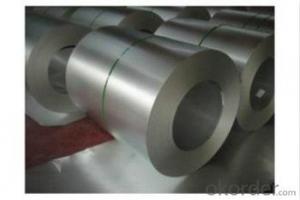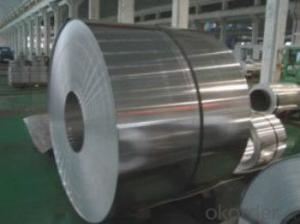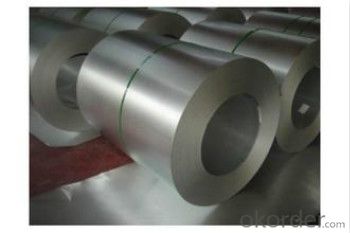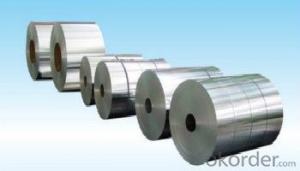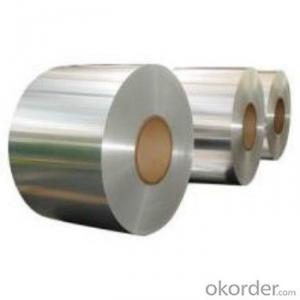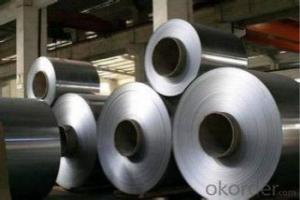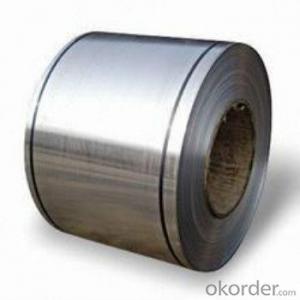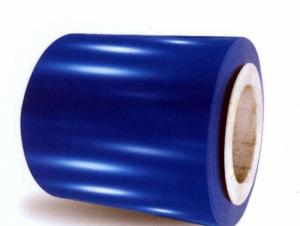6001 Aluminum Coil High Quality Mill Finished Aluminum Coil AA3003 Temper H18
- Loading Port:
- Tianjin
- Payment Terms:
- TT or LC
- Min Order Qty:
- 5 m.t.
- Supply Capability:
- 4000 m.t./month
OKorder Service Pledge
OKorder Financial Service
You Might Also Like
Specification
1. Aluminum Coil Description:
Aluminum coil, is a rolled product, produced in a coiled form of continuous strip, and having an ID (Inner diameter) and OD (Outer diameter).Common alloy coil are used for a wide variety of applications, alloy 1050, 1060, 3003, 3105, 3005, 5052, 5754, 5083, 6061, 8011, 8021, and so on, in thickness from 0.0065-7mm, in width from 300- 2200mm.
2.Main Features of the Aluminum Coil:
• Great ductility
• Heat conductivity
• Anti-corrosion
• Moisture resistanve
3.Aluminum Coil Images
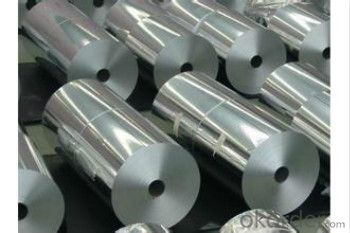
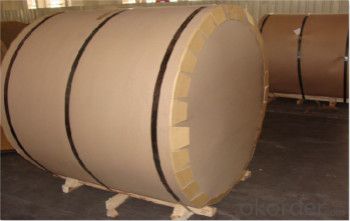
4.Aluminum Coil Specification
Aluminum Coil/Sheet | |
Main Specification | |
Alloy | AA1xxx (AA1050, AA1060, AA1070, AA1100 etc.) |
AA3xxx (AA3003, AA3004, AA3005, AA3105 etc.) | |
AA5xxx, AA6XXX (AA5052,AA5083, AA5754, AA6061, AA6062 etc.) | |
AA8xxx(AA8011, AA8006, AA8079 etc.) | |
Temper | H14,H16, H18, H22, H24, H26, H32,O/F |
Thickmess | ≥0.2mm |
Width | 30mm-2100mm |
Standard | GB/T 3880-2006 |
Special specification is available on customer's requirement | |
5.FAQ
We have organized several common questions for our clients,may help you sincerely:
(1) How to guarantee the quality of the products?
We have established the international advanced quality management system, every link from raw material to final product. we have strict quality test; we resolutely put an end to unqualified products flowing into the market. At the same time, we will provide necessary follow-up service assurance.
(2) MOQ?
For trail order, we accept 5 MT.
(3) Payment term?
30% deposit, balance against the BL copy; 100% L/C at sight
(4) What is the delivery time?
Depends on actual order, around 30 to 35 days
- Q: What is the maximum temperature resistance of aluminum coils?
- The maximum temperature resistance of aluminum coils depends on various factors, such as the alloy composition, purity, and the specific application. However, in general, aluminum has a relatively low melting point of around 660 degrees Celsius (1220 degrees Fahrenheit). Consequently, the maximum temperature resistance of aluminum coils typically ranges between 200 and 400 degrees Celsius (392 to 752 degrees Fahrenheit). Beyond these temperatures, aluminum may start to undergo structural changes, such as softening or deformation, which can impact its performance and integrity. Therefore, it is important to consider the specific requirements and limitations of the application when determining the maximum temperature resistance of aluminum coils.
- Q: What is a better deal?Aluminum Cookware ( Paula Deen)orHard Anodized ( Rachael Ray )
- Cook's Illustrated did a study on this and they ended up with the Walmart brand as the best buy because of the inexpensive price and good quality.
- Q: How are aluminum coils tested for surface cleanliness?
- Aluminum coils are typically tested for surface cleanliness using various methods such as visual inspection, solvent wipe tests, and surface roughness measurements. Visual inspection involves examining the surface of the coil for any visible contaminants or defects. Solvent wipe tests involve wiping the surface with a solvent-soaked cloth to check for any residue or contaminants that may be present. Surface roughness measurements are taken using specialized instruments to assess the smoothness of the coil's surface, which can indirectly indicate its cleanliness. These testing methods help ensure that aluminum coils meet the required standards and are free from any surface contaminants.
- Q: Is it possible to construct a tent or shelter using aluminum coils?
- <p>Yes, you can use aluminum coils to make a tent or shelter. Aluminum is lightweight, durable, and resistant to corrosion, making it a good material for temporary structures. You can use aluminum coil sheets to create the frame and support structure of the tent, ensuring it's strong and stable. However, you'll need to add a waterproof and insulating layer, such as canvas or tarpaulin, to protect against the elements. Remember to consider the weight, wind resistance, and ease of assembly when designing your shelter.</p>
- Q: Is it possible to utilize aluminum coils in the process of water treatment?
- <p>Yes, aluminum coils can be used for water treatment. They are often used in processes such as coagulation and flocculation, where aluminum salts are added to the water to help remove suspended particles and impurities. The aluminum ions react with the particles in the water to form larger, heavier particles that can be more easily settled or filtered out. Additionally, aluminum coils can be part of an electrode system in electrocoagulation processes, where an electric current is used to treat water by generating aluminum ions at the anode. This method is effective for removing various contaminants, including heavy metals, bacteria, and organic compounds.</p>
- Q: Are there any specific guidelines for the installation of aluminum coils?
- Yes, there are specific guidelines for the installation of aluminum coils. When installing aluminum coils, it is important to follow manufacturer's instructions and adhere to industry standards. Some specific guidelines for the installation of aluminum coils include: 1. Proper handling: Aluminum coils should be handled with care to prevent damage. It is recommended to use gloves and avoid dropping or dragging the coils during installation. 2. Compatibility: Ensure that the aluminum coils are compatible with the HVAC system you are installing. Consider factors such as coil size, capacity, and refrigerant type. 3. Coil orientation: Pay attention to the correct orientation of the coil during installation. This includes ensuring that the airflow direction matches the system's requirements. 4. Alignment: Proper alignment of the aluminum coil is crucial for efficient operation. Make sure the coil is level and securely attached to the mounting brackets. 5. Condensate drainage: Ensure that the condensate drain pans and lines are properly installed and functioning. This helps in preventing water leakage and potential damage. 6. Electrical connections: Follow electrical guidelines provided by the manufacturer to ensure proper wiring and connections for the aluminum coil. 7. Insulation: Insulate the refrigerant lines and ductwork as required to prevent condensation and improve energy efficiency. 8. Clearances: Maintain adequate clearances around the aluminum coil for proper airflow and service access. This includes ensuring that there is enough space for cleaning and maintenance. 9. Testing: After installation, perform necessary tests and inspections to ensure the aluminum coil is functioning properly. This may include checking for refrigerant leaks, verifying proper airflow, and testing the system's performance. It is important to consult the manufacturer's installation instructions and any applicable building codes or regulations before installing aluminum coils. Following these specific guidelines will help ensure a successful installation and optimal performance of the aluminum coils.
- Q: What is the purpose or use of aluminum coil in various applications?
- <p>Aluminum coil is a versatile material used in a wide range of applications due to its properties such as lightweight, corrosion resistance, and high thermal and electrical conductivity. It is commonly used in construction for roofing and siding, in the manufacturing of heat exchangers and radiators, and in electrical applications like transformers and power lines. Aluminum coil is also utilized in packaging, such as food and beverage cans, and in automotive and aerospace industries for lightweight components. Its malleability allows it to be easily shaped and formed, making it an ideal material for various industrial processes.</p>
- Q: Aluminum roll width 750mm, single layer thickness 6.5mm, diameter 400mm., how to calculate the weight of the aluminum roll?
- You can use the outside diameter, the inner diameter and the width to get the volume. You know the density and volume, and then you can find the weight naturally
- Q: How are aluminum coils protected from corrosion?
- Aluminum coils are protected from corrosion through various methods, including the application of protective coatings such as paint or anodizing, using corrosion-resistant alloys, and applying a layer of zinc through a process called galvanizing. These protective measures create a barrier between the aluminum surface and external elements, preventing corrosion and extending the lifespan of the coils.
- Q: What are the various classifications of aluminum coil grades?
- <p>Aluminum coils are classified into different grades based on their composition and properties. The most common grades include 1000 series (99% pure aluminum), 3000 series (aluminum-manganese alloys), 5000 series (aluminum-magnesium alloys), and 6000 series (aluminum-silico-magnesium alloys). Each series has specific characteristics, such as corrosion resistance, formability, and strength, which determine their suitability for various applications like construction, transportation, and packaging. Additionally, there are 2000 series (aluminum-copper alloys), 4000 series (aluminum-silicon alloys), 7000 series (aluminum-zinc-magnesium alloys), and 8000 series (other alloys), each with unique properties and applications.</p>
Send your message to us
6001 Aluminum Coil High Quality Mill Finished Aluminum Coil AA3003 Temper H18
- Loading Port:
- Tianjin
- Payment Terms:
- TT or LC
- Min Order Qty:
- 5 m.t.
- Supply Capability:
- 4000 m.t./month
OKorder Service Pledge
OKorder Financial Service
Similar products
Hot products
Hot Searches
Related keywords
